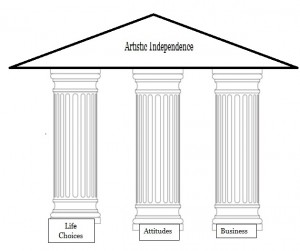 In my opinion, there are three pillars to artistic independence:
In my opinion, there are three pillars to artistic independence:
- Life choices
- Attitudes
- Business
LIFE CHOICES are about the choices you make about how you want to live that have an impact on your work:
Where you want to live?
If you live in Manhattan, it is different than living in Des Mines and it impacts your work. If you want to put down roots and live in a single place it is different than if you want to live on the road, and that has an impact on your work.
How do you want to live?
If you feel it is important to live in a 2400 sq ft house it impacts your work.
Who do you want to live with?
Do you want a family? Do you want a significant other?
Life choices include and all the myriad everyday choices you make about how you spend your time and money. If you hate to cook and so you eat out almost every meal, that affects your work. If you don’t know how to cook, and so you eat a lot of crap, that affects your health, which affects your work. If you like to wear the latest stylish clothing, that affects your budget, and so it affects your work. If you need a car, that affects your budget and so affects your work.
Your life choices are not separate from your work.
ATTITUDES are your ideas concerning success, concerning the art form, concerning value. If you define success in terms of fame or in terms of financial success, that affects your work. If you think “real” theatre only takes place in theatre buildings and involve sets, and lights, and costumes and a play and actors and it only takes place at 7:30pm or matinees on Sunday and only for people who pay for a ticket… that affects your work. If you value popularity more than impact, that affects your work.
Your attitudes and assumptions are the foundation upon which you build your artistic life.
Finally, there is BUSINESS. Business is the different ways you can make your life sustainable as an artist. It’s not just money, it is sustainability. How much time can you spend doing the things you love? How much time do you have to rest, live, spend time with friends and family, think, read, grow? Who are your customers? How do you make your work available to them? How do you communicate with them? What is your relationship with them? How much are they willing to pay for what you offer? How do they pay you? What makes what you do valuable to them?
It is important to consider each of these pillars honestly, asking yourself not what you want, but what you need to be happy. There is an old saying: “Begin as you mean to continue.” While you may be able to ignore your needs for a while, at a certain point those sacrifices will begin to be felt all-too-painfully, and the result will be a desire to give up. Be honest with yourself. Each decision will affect your work.
So creative insubordination begins with thoughtful reflection.

Leave a Reply